The WMS was excited to head to Spokane, WA for this year’s Summer Conference. This year’s conference included over 300 in-person participants and nearly 200 virtual participants from 11 different countries. Below we hear from three Conference Ambassadors who were awarded WMS Student/Resident Conference Scholarships.
Coming From Far But Making Connections
Sierra Soghikian, MS-II
Tufts University School of Medicine
It felt like I had to move mountains to get to my first WMS Conference. My flights from the east were delayed and I magically got one of the last connections. I think this travel experience speaks to the wilderness medicine profession – there can be many things out of your control and it is important to take a breath, let those go, and focus on what you can manage.
Even though I began the first morning with three hours of sleep, I was immediately greeted with smiles and friendly introductions at breakfast. I was apprehensive about not knowing anyone at the conference but this fear instantaneously dissolved chatting with other attendees. I forget how small the wilderness medicine community is. Within minutes, I established east coast skiing connections with the WMS president to my left and medical school connections with the student to my right. As more ties were established throughout my week, the nerves of a first-time attendee faded and I felt like I could be my authentic self.
One of the highlights of the conference was talking to a variety of people in different stages of their wilderness medicine career. The president of WMS stated in his opening lecture that if you are just starting your wilderness medicine career: keep moving forward- since you never know where it will take you. This statement resonated with me as I am just starting my second year of medical school and I am dipping my toes into wilderness medicine. I received a lot of great feedback and I have been engaging in deeper conversations with a range of medical professionals. The WMS provides inherent mentorship whuch is crucial for young medical professionals unsure of their future path. I attended the mentorship meeting where we learned what makes a good mentee-mentor relationship and I had the opportunity to mingle with others. It was awesome to make connections with like-minded individuals and garner advice from those who have been part of wilderness medicine for years.
The WMS summer conference was filled with engaging lectures, hands-on practice (like demonstrations of simple mechanical advantage used in rope rescues), research presentations, and enduring conversations with a variety of medical professionals. This was my first conference, but it will not be my last. I left Spokane with a greater interest in wilderness medicine as well as multiple mentors who have shown excitement in providing me with direction.
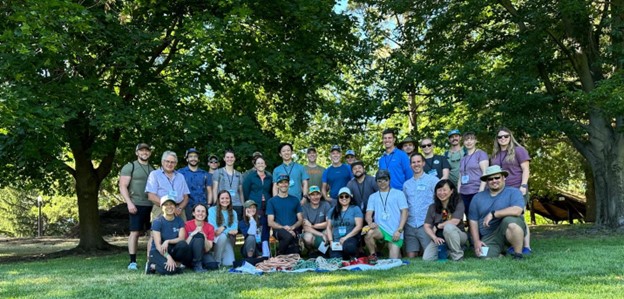
Simple Mechanical Advantage Workshop - Taught by Martin Musi who is the Wilderness & Environmental Fellowship Director at University of Colorado School of Medicine as well as a member of the Rocky Mountain Rescue Group.
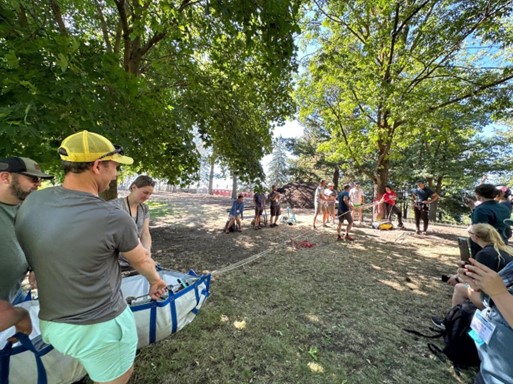
Simple Mechanical Advantage Workshop - We spent the afternoon building anchors and constructing three-to-one and four-to-one mechanical advantages which can be used in glacier crevasse and big mountain rescues.
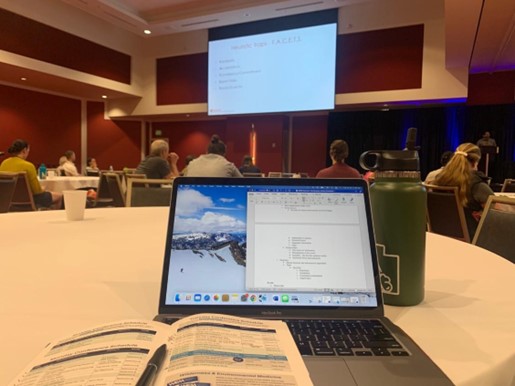
Decision Making: The Changing Risk Reward Paradigm - Taking lecture notes as Dr. Avi Patil discusses how familiarity and personal heuristics, aka a mental shortcut used to simplify problems, can be problematic to decision making in a remote wilderness environment.
Purpose, Passion, and Service: A WMS Experience
Ayla Chase, FAWM Candidate
Johns Hopkins University School of Nursing
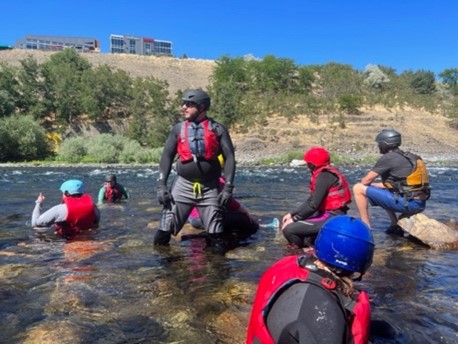
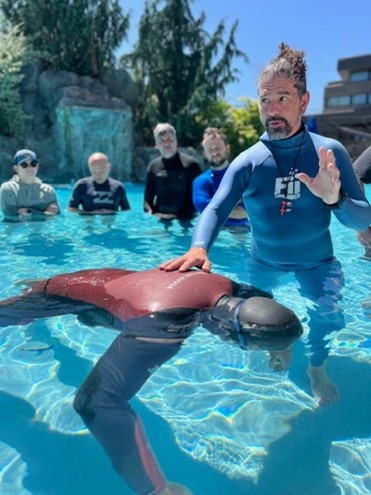
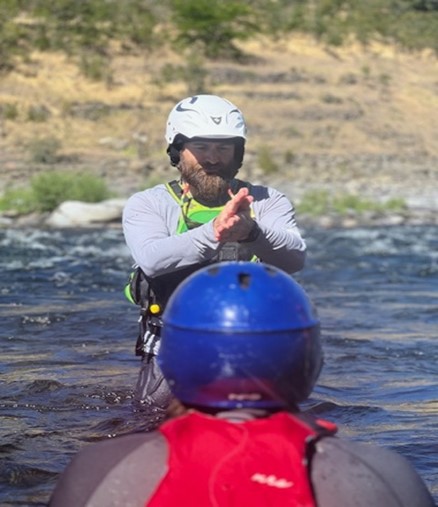
Introduction to Swift Water Rescue, Freediving and Breath Holding, Introduction to Swift Water Rescue
I often ask of others, “What inspires you to pursue your craft?” It is not enough to be someone who enjoys the outdoors, though that is a common quality among us, but it is also important to train with the skills and education to act in challenging environments and situations. Among the many innovative resources and attributes on display at the conference, what stood out to me most was the attendees’ passion for the outdoors while creating a space that allows for everyone to be alive in the wild. A true steward of their profession seeks the unknown and, in the outdoors, the unknown surrounds us. We must mirror the adaptability we see in nature. In our Case Study Wilderness Survival Workshop with Dr. Todd Miner, we compared and discussed the many ways different items could be used in a survival setting, including knot tying, shelter building, and fire starting! In the freediving and breath-holding workshop, the instructors talked about the importance of developing increased awareness, presence, and mindfulness- all things that translated to their daily practice of medicine. We really dipped our toes in with the introduction to swift water rescue by learning to read waves, “triangulating” a rescue, and hands-on experience throwing a rope bag.
The weight on a trained person’s shoulders in these settings is more than just their packs; along with hands-on experiences there were also evidence-based practice and case-based lectures. One of my favorite talks was the one on emerging infectious diseases by Michael Callahan where he discussed COVID-19 through the lens of cruise ships medicine and the international lessons learned. I also deeply appreciated my newfound knowledge on the North American ravenous racoon and biting beaver attacks by Benjamin Woodard.
There was a spark in the attendees I met at the conference that when shared, lit an entire community of medicine that serves in more than just in the backcountry, but also in disaster response, humanitarian aid– in our backyards, the backcountry, and globally! One could say that the purpose of life is summarized as simply finding meaning and sharing it; this statement resonated with me even more after experiencing this community and their shared commitment to being, and staying, alive in the wild wherever your wild place may be.
No Boundaries – All Connections
Deborah Trimble, MD
PGY-3 Emergency Medicine Resident, FAWM Candidate
Corewell East Beaumont - Royal Oak
An endless sea, the uninterrupted forest, the daunting mountain, and the unbroken spirit – what is the common thread? Some may say adventure, danger, and even peace; however, these are all connected by the possibility of pushing boundaries. What could it mean to have no boundaries, not be compelled by convention or tradition in work, society, and life?
I was introduced to wilderness medicine just over a year ago at the SAEM Annual Meeting. I could hardly conceptualize medical care outside the traditional “house of medicine” in which we learn and train. It was a novel yet thrilling concept. Over this past year, I spent many of my free hours learning about wilderness medicine, scratching the surface of disaster response, austere and expedition medicine, search and rescue, mountaineering and diving medicine. Seemingly every turn of the learning wheel is both different and simultaneously connected by life and experiences happening in inconvenient places and times, out of bounds.
Attending the 2023 WMS Summer Conference was eye opening! It would be difficult to capture the experience of interacting with divers, paddlers, mountain climbers, skiers, climate change advocates, combat medics, both students and experts under one roof and in the span of three days. The breadth of experience and passion is unparalleled. The lectures were packed with knowledge bombs and more than a few laughs. Afternoon workshops brought together groups of diverse individuals to learn, engage, and establish professional acquaintances. The celebration of the 40th anniversary of WMS, an 80’s themed “sip ‘n stroll” was also a highlight- the who’s who of WMS in costume and a fun way to forge new friends.
There were two specific threads that stood out throughout the conference. First, there was a deep and palpable individual connection to nature and our experiences in it. Everyone I spoke with was engaged in outdoor activities and helping others to do the same. The second, which I have only realized in reflecting over the conference experience, is that the only confines to this varied but connected field are the ones we put on it. I am excited to continue to explore and find my own niche.
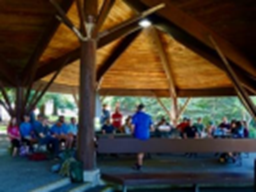
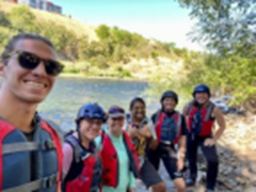
Survival Workshop, Swiftwater Crew